Fostering Respect and Dignity: Healthcare Management
VerifiedAdded on 2023/04/22
|15
|4306
|421
AI Summary
This study explores the challenges faced by individuals with learning disabilities in healthcare management and the importance of fostering respect and dignity. It discusses the impact of ethical principles, communication skills, and interpersonal relationships in providing quality care. The case study of Sarah and Daniel highlights the need for autonomy, freedom, and vulnerability in healthcare decision-making. The study emphasizes the role of healthcare professionals in promoting respect and dignity for patients with disabilities.
Contribute Materials
Your contribution can guide someone’s learning journey. Share your
documents today.
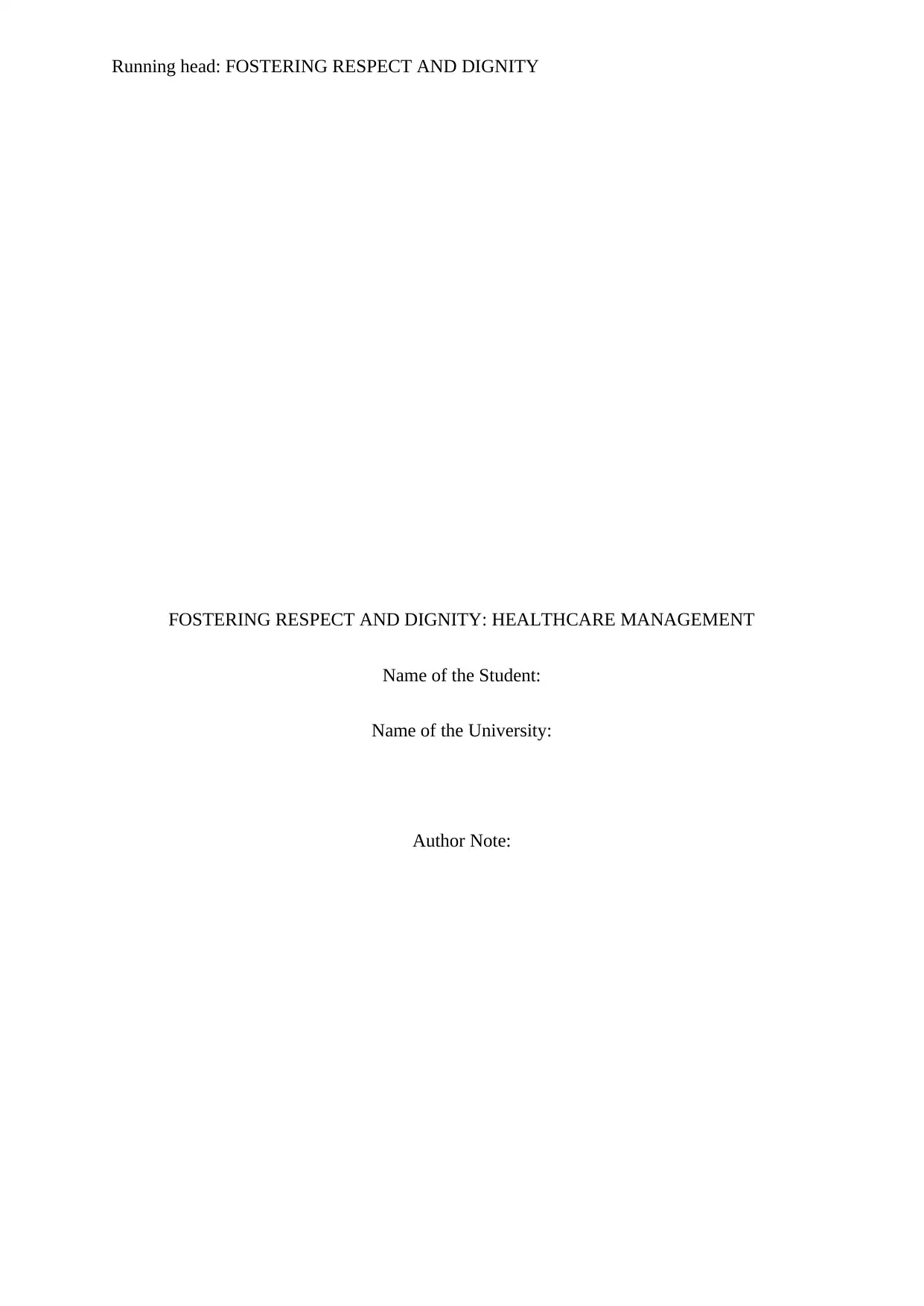
Running head: FOSTERING RESPECT AND DIGNITY
FOSTERING RESPECT AND DIGNITY: HEALTHCARE MANAGEMENT
Name of the Student:
Name of the University:
Author Note:
FOSTERING RESPECT AND DIGNITY: HEALTHCARE MANAGEMENT
Name of the Student:
Name of the University:
Author Note:
Secure Best Marks with AI Grader
Need help grading? Try our AI Grader for instant feedback on your assignments.

1FOSTERING RESPECT AND DIGNITY:HEALTHCARE MANAGEMENT
Contents
Answer 1....................................................................................................................................2
Answer 2:...................................................................................................................................5
Answer 3:.................................................................................................................................10
References................................................................................................................................12
Contents
Answer 1....................................................................................................................................2
Answer 2:...................................................................................................................................5
Answer 3:.................................................................................................................................10
References................................................................................................................................12

2FOSTERING RESPECT AND DIGNITY:HEALTHCARE MANAGEMENT
Answer 1
The given study revolves around the life of Sarah Thompson and her partner Daniel
Drayton who suffer from various learning disabilities.They were restrained by the social care
department which is run by the local authorities, from marrying each other. After months of
mental harassment and fulfilling various ethical regulations, Sarah had to give a capacity
assessment against her wishes. The capacity test was conducted to assess her capabilities of
having sexual relations and the liabilities involved after marriage along chances of any
physical assault or abuse. Although her assessors knew she was capable, she failed as a result
of which they were not allowed to marry. Here, the Mental Capacity Act passed in 2015 is
considered whichsays that the person involved must be assumed to have the required capacity
of carrying out all activities until it is established that the involved person actually lacks the
capacity.Moreover, he or she is not able to undergo the process of decision making until and
unless there are various practical steps, which are implemented and or helped him to carry out
the task without success.The person should not be assumed of not carrying out responsible
tasks until it is clinically proved so.Any decision made or act done under these principles
must be regarded with respect to whether the purpose is served and whether the decision can
be effectively achieved in such a way that it is not or restrictive in terms of the person’s
freedom of action as well as person’s individual rights.Any decision made or act done for a
person should be undone or completed according to the best interests of the person (Brown,
Barber and Martin, 2015)
Ethics has always been a pivotal part of health care professional. It refers to the
various principles andvalues, which concern professional ethics as well as human conduct
and the rules and regulations, which are acceptable in a particular group. Healthcare ethics
involves professionalism and this enforcement of ethics has the capability of enhancing
visibility as well as confidence among the professionals. Ethical principles are different from
Answer 1
The given study revolves around the life of Sarah Thompson and her partner Daniel
Drayton who suffer from various learning disabilities.They were restrained by the social care
department which is run by the local authorities, from marrying each other. After months of
mental harassment and fulfilling various ethical regulations, Sarah had to give a capacity
assessment against her wishes. The capacity test was conducted to assess her capabilities of
having sexual relations and the liabilities involved after marriage along chances of any
physical assault or abuse. Although her assessors knew she was capable, she failed as a result
of which they were not allowed to marry. Here, the Mental Capacity Act passed in 2015 is
considered whichsays that the person involved must be assumed to have the required capacity
of carrying out all activities until it is established that the involved person actually lacks the
capacity.Moreover, he or she is not able to undergo the process of decision making until and
unless there are various practical steps, which are implemented and or helped him to carry out
the task without success.The person should not be assumed of not carrying out responsible
tasks until it is clinically proved so.Any decision made or act done under these principles
must be regarded with respect to whether the purpose is served and whether the decision can
be effectively achieved in such a way that it is not or restrictive in terms of the person’s
freedom of action as well as person’s individual rights.Any decision made or act done for a
person should be undone or completed according to the best interests of the person (Brown,
Barber and Martin, 2015)
Ethics has always been a pivotal part of health care professional. It refers to the
various principles andvalues, which concern professional ethics as well as human conduct
and the rules and regulations, which are acceptable in a particular group. Healthcare ethics
involves professionalism and this enforcement of ethics has the capability of enhancing
visibility as well as confidence among the professionals. Ethical principles are different from

3FOSTERING RESPECT AND DIGNITY:HEALTHCARE MANAGEMENT
professional ethics which include referencing other people in corporate norms(Kangasniemi ,
Pakkanen and Korhonen ,2015 ). Ethical grand rounds are teaching strategies for enhancing
the decision making process of nursing . It is often divided into normative ethics and applied
ethics (irth-Kindree and Kirnhorn, 2016).
People suffering mental disabilities face a lot of ethical challenges. An ethical
challenge aligns with the principle ethics, where it is defined as the situation involving
disagreement as well as uncertainty about the right or wrong decision. Such challenges are
abundant in medical healthcare. In such situations, patients usually do not agree about being
cared and given treatment properly. Some situations involve uncertainty of the prognosis,
diagnosis or the kind of treatment given. Further symptoms include reduced functioning of
psychosocially, stigma, as well as self-harm being implemented or power abusing and
suicidal ideation(Hem et al.2015).Healthcare ethics include the various principles for
example principle of beneficence, non-maleficence, justice, principle of proportionality,
Principle of beneficence, health maximisation, is also considered alongside common ethics
like repect, dignity, freedom, and rights and responsibilities.
Vulnerability according to the European origin is actually viewed as an indelible as
well as universal condition among all human beings. Various researchers have put forward
various theories regarding inclusion of principles of vulnerability as one of the pivotal
principles of healthcare ethics. According to Levinas, it is the basic principle of subjectivity
and inclusion of ethics. However according to Jonas it an inborn attribute with which human
beings are born and die eventually. Living human beings are responsible behind causing pain
and distress to all other human beings. Principle of vulnerability has been expressed
according to the Universal Declaration involving Human rights and Bioethics and the
possible consideration of contingent and ontological aspects which is an integral part of
global bioethics.According to the case study mentioned, Sarah and Daniel are a couple with
professional ethics which include referencing other people in corporate norms(Kangasniemi ,
Pakkanen and Korhonen ,2015 ). Ethical grand rounds are teaching strategies for enhancing
the decision making process of nursing . It is often divided into normative ethics and applied
ethics (irth-Kindree and Kirnhorn, 2016).
People suffering mental disabilities face a lot of ethical challenges. An ethical
challenge aligns with the principle ethics, where it is defined as the situation involving
disagreement as well as uncertainty about the right or wrong decision. Such challenges are
abundant in medical healthcare. In such situations, patients usually do not agree about being
cared and given treatment properly. Some situations involve uncertainty of the prognosis,
diagnosis or the kind of treatment given. Further symptoms include reduced functioning of
psychosocially, stigma, as well as self-harm being implemented or power abusing and
suicidal ideation(Hem et al.2015).Healthcare ethics include the various principles for
example principle of beneficence, non-maleficence, justice, principle of proportionality,
Principle of beneficence, health maximisation, is also considered alongside common ethics
like repect, dignity, freedom, and rights and responsibilities.
Vulnerability according to the European origin is actually viewed as an indelible as
well as universal condition among all human beings. Various researchers have put forward
various theories regarding inclusion of principles of vulnerability as one of the pivotal
principles of healthcare ethics. According to Levinas, it is the basic principle of subjectivity
and inclusion of ethics. However according to Jonas it an inborn attribute with which human
beings are born and die eventually. Living human beings are responsible behind causing pain
and distress to all other human beings. Principle of vulnerability has been expressed
according to the Universal Declaration involving Human rights and Bioethics and the
possible consideration of contingent and ontological aspects which is an integral part of
global bioethics.According to the case study mentioned, Sarah and Daniel are a couple with
Secure Best Marks with AI Grader
Need help grading? Try our AI Grader for instant feedback on your assignments.
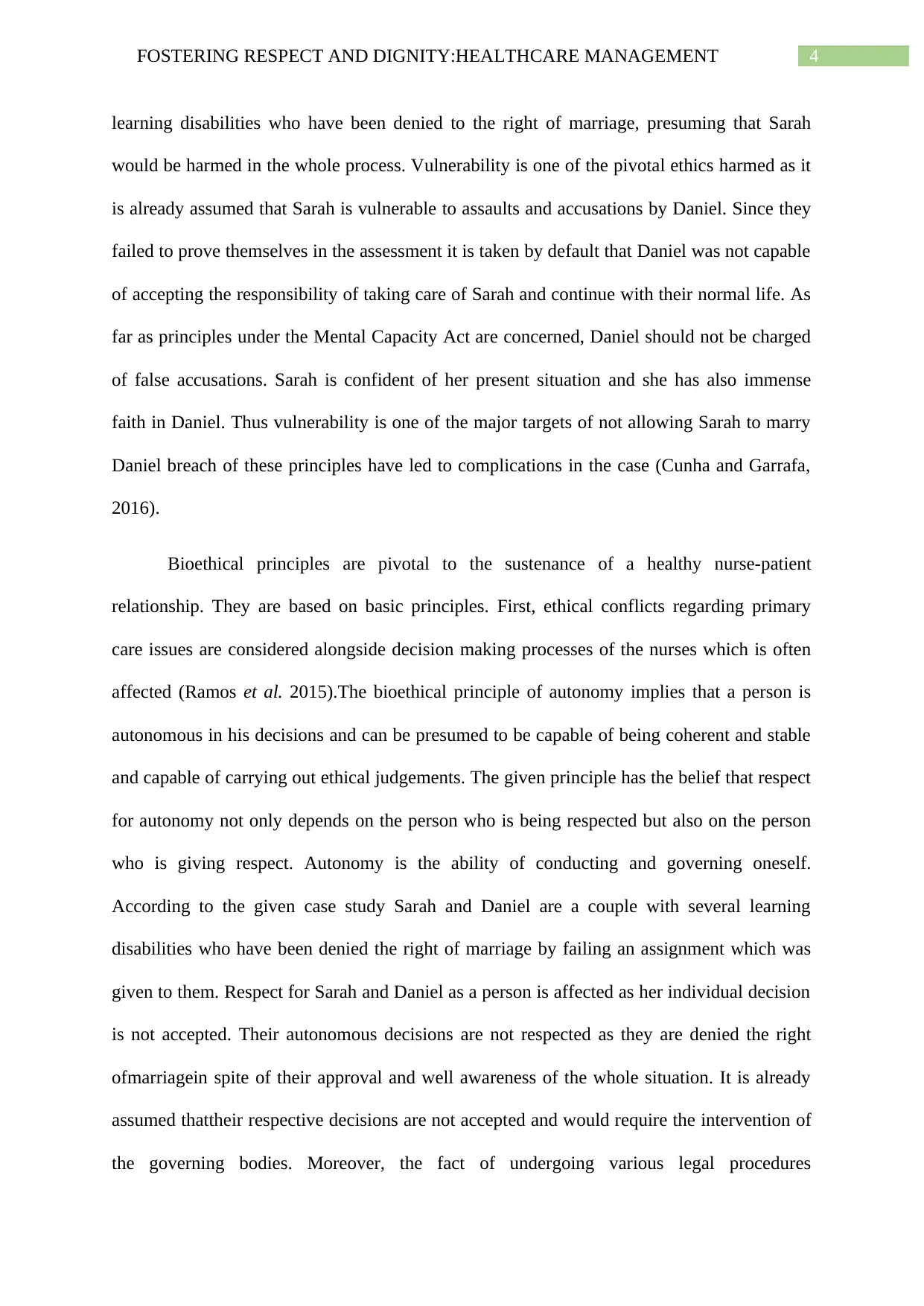
4FOSTERING RESPECT AND DIGNITY:HEALTHCARE MANAGEMENT
learning disabilities who have been denied to the right of marriage, presuming that Sarah
would be harmed in the whole process. Vulnerability is one of the pivotal ethics harmed as it
is already assumed that Sarah is vulnerable to assaults and accusations by Daniel. Since they
failed to prove themselves in the assessment it is taken by default that Daniel was not capable
of accepting the responsibility of taking care of Sarah and continue with their normal life. As
far as principles under the Mental Capacity Act are concerned, Daniel should not be charged
of false accusations. Sarah is confident of her present situation and she has also immense
faith in Daniel. Thus vulnerability is one of the major targets of not allowing Sarah to marry
Daniel breach of these principles have led to complications in the case (Cunha and Garrafa,
2016).
Bioethical principles are pivotal to the sustenance of a healthy nurse-patient
relationship. They are based on basic principles. First, ethical conflicts regarding primary
care issues are considered alongside decision making processes of the nurses which is often
affected (Ramos et al. 2015).The bioethical principle of autonomy implies that a person is
autonomous in his decisions and can be presumed to be capable of being coherent and stable
and capable of carrying out ethical judgements. The given principle has the belief that respect
for autonomy not only depends on the person who is being respected but also on the person
who is giving respect. Autonomy is the ability of conducting and governing oneself.
According to the given case study Sarah and Daniel are a couple with several learning
disabilities who have been denied the right of marriage by failing an assignment which was
given to them. Respect for Sarah and Daniel as a person is affected as her individual decision
is not accepted. Their autonomous decisions are not respected as they are denied the right
ofmarriagein spite of their approval and well awareness of the whole situation. It is already
assumed thattheir respective decisions are not accepted and would require the intervention of
the governing bodies. Moreover, the fact of undergoing various legal procedures
learning disabilities who have been denied to the right of marriage, presuming that Sarah
would be harmed in the whole process. Vulnerability is one of the pivotal ethics harmed as it
is already assumed that Sarah is vulnerable to assaults and accusations by Daniel. Since they
failed to prove themselves in the assessment it is taken by default that Daniel was not capable
of accepting the responsibility of taking care of Sarah and continue with their normal life. As
far as principles under the Mental Capacity Act are concerned, Daniel should not be charged
of false accusations. Sarah is confident of her present situation and she has also immense
faith in Daniel. Thus vulnerability is one of the major targets of not allowing Sarah to marry
Daniel breach of these principles have led to complications in the case (Cunha and Garrafa,
2016).
Bioethical principles are pivotal to the sustenance of a healthy nurse-patient
relationship. They are based on basic principles. First, ethical conflicts regarding primary
care issues are considered alongside decision making processes of the nurses which is often
affected (Ramos et al. 2015).The bioethical principle of autonomy implies that a person is
autonomous in his decisions and can be presumed to be capable of being coherent and stable
and capable of carrying out ethical judgements. The given principle has the belief that respect
for autonomy not only depends on the person who is being respected but also on the person
who is giving respect. Autonomy is the ability of conducting and governing oneself.
According to the given case study Sarah and Daniel are a couple with several learning
disabilities who have been denied the right of marriage by failing an assignment which was
given to them. Respect for Sarah and Daniel as a person is affected as her individual decision
is not accepted. Their autonomous decisions are not respected as they are denied the right
ofmarriagein spite of their approval and well awareness of the whole situation. It is already
assumed thattheir respective decisions are not accepted and would require the intervention of
the governing bodies. Moreover, the fact of undergoing various legal procedures
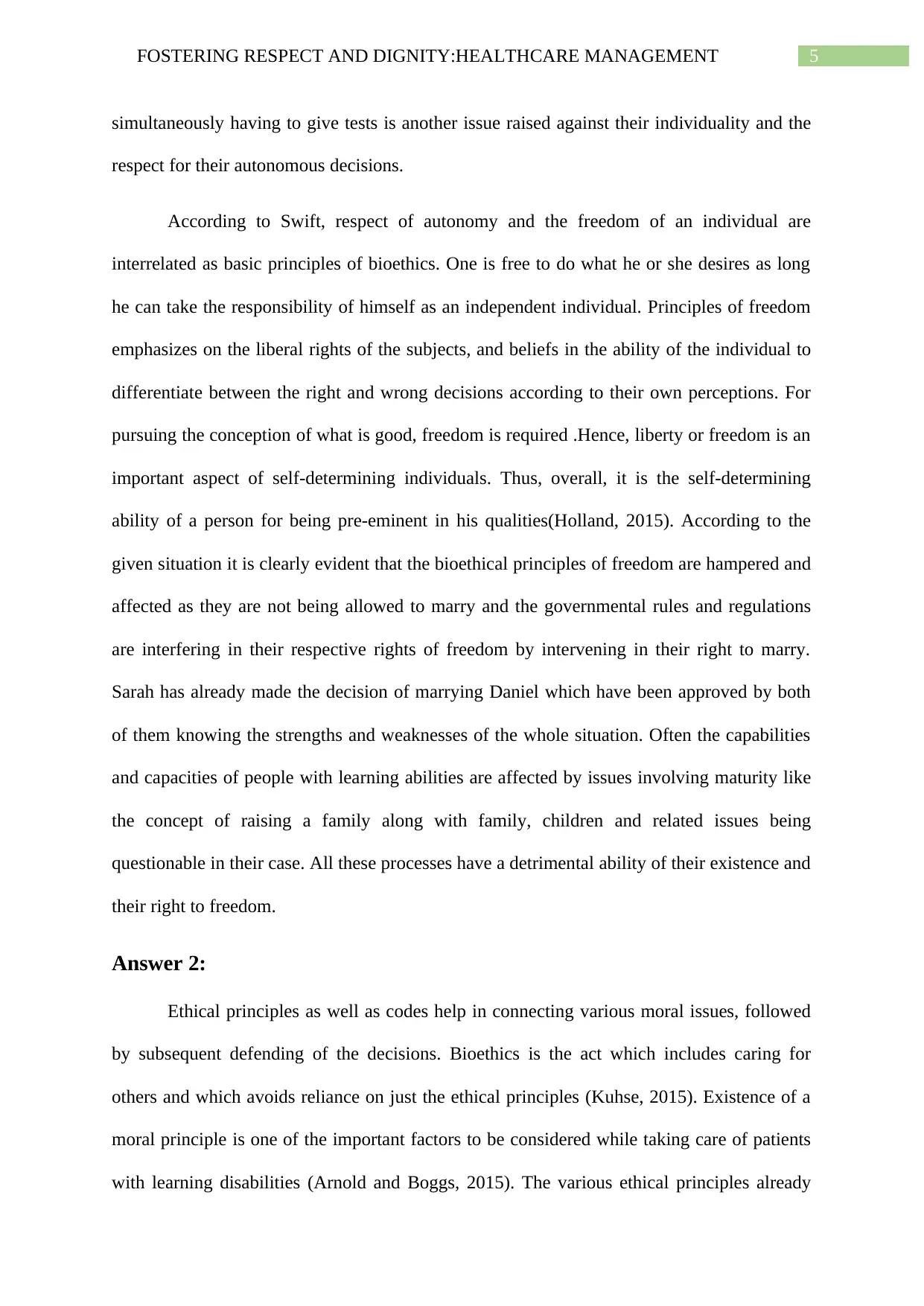
5FOSTERING RESPECT AND DIGNITY:HEALTHCARE MANAGEMENT
simultaneously having to give tests is another issue raised against their individuality and the
respect for their autonomous decisions.
According to Swift, respect of autonomy and the freedom of an individual are
interrelated as basic principles of bioethics. One is free to do what he or she desires as long
he can take the responsibility of himself as an independent individual. Principles of freedom
emphasizes on the liberal rights of the subjects, and beliefs in the ability of the individual to
differentiate between the right and wrong decisions according to their own perceptions. For
pursuing the conception of what is good, freedom is required .Hence, liberty or freedom is an
important aspect of self-determining individuals. Thus, overall, it is the self-determining
ability of a person for being pre-eminent in his qualities(Holland, 2015). According to the
given situation it is clearly evident that the bioethical principles of freedom are hampered and
affected as they are not being allowed to marry and the governmental rules and regulations
are interfering in their respective rights of freedom by intervening in their right to marry.
Sarah has already made the decision of marrying Daniel which have been approved by both
of them knowing the strengths and weaknesses of the whole situation. Often the capabilities
and capacities of people with learning abilities are affected by issues involving maturity like
the concept of raising a family along with family, children and related issues being
questionable in their case. All these processes have a detrimental ability of their existence and
their right to freedom.
Answer 2:
Ethical principles as well as codes help in connecting various moral issues, followed
by subsequent defending of the decisions. Bioethics is the act which includes caring for
others and which avoids reliance on just the ethical principles (Kuhse, 2015). Existence of a
moral principle is one of the important factors to be considered while taking care of patients
with learning disabilities (Arnold and Boggs, 2015). The various ethical principles already
simultaneously having to give tests is another issue raised against their individuality and the
respect for their autonomous decisions.
According to Swift, respect of autonomy and the freedom of an individual are
interrelated as basic principles of bioethics. One is free to do what he or she desires as long
he can take the responsibility of himself as an independent individual. Principles of freedom
emphasizes on the liberal rights of the subjects, and beliefs in the ability of the individual to
differentiate between the right and wrong decisions according to their own perceptions. For
pursuing the conception of what is good, freedom is required .Hence, liberty or freedom is an
important aspect of self-determining individuals. Thus, overall, it is the self-determining
ability of a person for being pre-eminent in his qualities(Holland, 2015). According to the
given situation it is clearly evident that the bioethical principles of freedom are hampered and
affected as they are not being allowed to marry and the governmental rules and regulations
are interfering in their respective rights of freedom by intervening in their right to marry.
Sarah has already made the decision of marrying Daniel which have been approved by both
of them knowing the strengths and weaknesses of the whole situation. Often the capabilities
and capacities of people with learning abilities are affected by issues involving maturity like
the concept of raising a family along with family, children and related issues being
questionable in their case. All these processes have a detrimental ability of their existence and
their right to freedom.
Answer 2:
Ethical principles as well as codes help in connecting various moral issues, followed
by subsequent defending of the decisions. Bioethics is the act which includes caring for
others and which avoids reliance on just the ethical principles (Kuhse, 2015). Existence of a
moral principle is one of the important factors to be considered while taking care of patients
with learning disabilities (Arnold and Boggs, 2015). The various ethical principles already
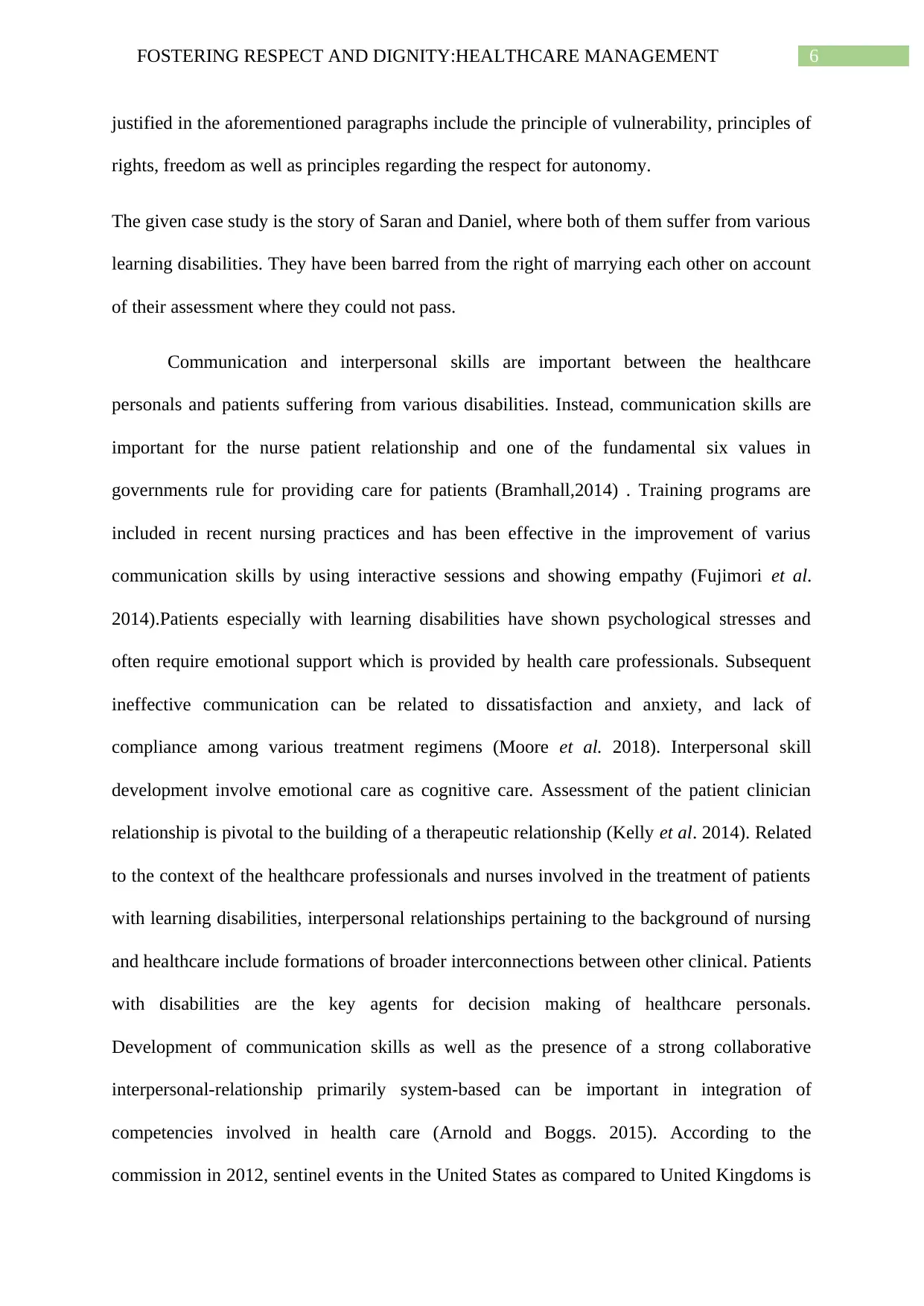
6FOSTERING RESPECT AND DIGNITY:HEALTHCARE MANAGEMENT
justified in the aforementioned paragraphs include the principle of vulnerability, principles of
rights, freedom as well as principles regarding the respect for autonomy.
The given case study is the story of Saran and Daniel, where both of them suffer from various
learning disabilities. They have been barred from the right of marrying each other on account
of their assessment where they could not pass.
Communication and interpersonal skills are important between the healthcare
personals and patients suffering from various disabilities. Instead, communication skills are
important for the nurse patient relationship and one of the fundamental six values in
governments rule for providing care for patients (Bramhall,2014) . Training programs are
included in recent nursing practices and has been effective in the improvement of varius
communication skills by using interactive sessions and showing empathy (Fujimori et al.
2014).Patients especially with learning disabilities have shown psychological stresses and
often require emotional support which is provided by health care professionals. Subsequent
ineffective communication can be related to dissatisfaction and anxiety, and lack of
compliance among various treatment regimens (Moore et al. 2018). Interpersonal skill
development involve emotional care as cognitive care. Assessment of the patient clinician
relationship is pivotal to the building of a therapeutic relationship (Kelly et al. 2014). Related
to the context of the healthcare professionals and nurses involved in the treatment of patients
with learning disabilities, interpersonal relationships pertaining to the background of nursing
and healthcare include formations of broader interconnections between other clinical. Patients
with disabilities are the key agents for decision making of healthcare personals.
Development of communication skills as well as the presence of a strong collaborative
interpersonal-relationship primarily system-based can be important in integration of
competencies involved in health care (Arnold and Boggs. 2015). According to the
commission in 2012, sentinel events in the United States as compared to United Kingdoms is
justified in the aforementioned paragraphs include the principle of vulnerability, principles of
rights, freedom as well as principles regarding the respect for autonomy.
The given case study is the story of Saran and Daniel, where both of them suffer from various
learning disabilities. They have been barred from the right of marrying each other on account
of their assessment where they could not pass.
Communication and interpersonal skills are important between the healthcare
personals and patients suffering from various disabilities. Instead, communication skills are
important for the nurse patient relationship and one of the fundamental six values in
governments rule for providing care for patients (Bramhall,2014) . Training programs are
included in recent nursing practices and has been effective in the improvement of varius
communication skills by using interactive sessions and showing empathy (Fujimori et al.
2014).Patients especially with learning disabilities have shown psychological stresses and
often require emotional support which is provided by health care professionals. Subsequent
ineffective communication can be related to dissatisfaction and anxiety, and lack of
compliance among various treatment regimens (Moore et al. 2018). Interpersonal skill
development involve emotional care as cognitive care. Assessment of the patient clinician
relationship is pivotal to the building of a therapeutic relationship (Kelly et al. 2014). Related
to the context of the healthcare professionals and nurses involved in the treatment of patients
with learning disabilities, interpersonal relationships pertaining to the background of nursing
and healthcare include formations of broader interconnections between other clinical. Patients
with disabilities are the key agents for decision making of healthcare personals.
Development of communication skills as well as the presence of a strong collaborative
interpersonal-relationship primarily system-based can be important in integration of
competencies involved in health care (Arnold and Boggs. 2015). According to the
commission in 2012, sentinel events in the United States as compared to United Kingdoms is
Paraphrase This Document
Need a fresh take? Get an instant paraphrase of this document with our AI Paraphraser
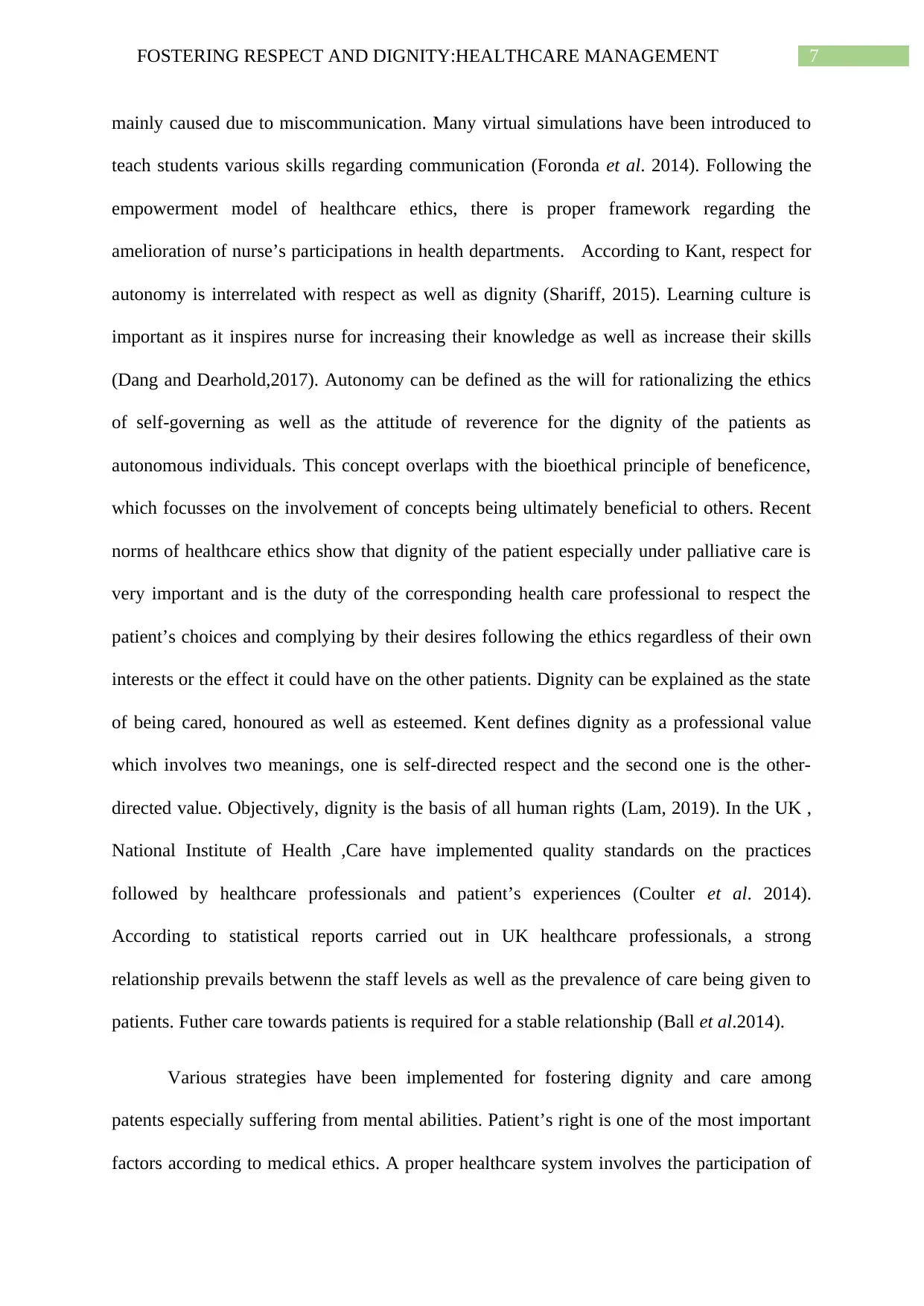
7FOSTERING RESPECT AND DIGNITY:HEALTHCARE MANAGEMENT
mainly caused due to miscommunication. Many virtual simulations have been introduced to
teach students various skills regarding communication (Foronda et al. 2014). Following the
empowerment model of healthcare ethics, there is proper framework regarding the
amelioration of nurse’s participations in health departments. According to Kant, respect for
autonomy is interrelated with respect as well as dignity (Shariff, 2015). Learning culture is
important as it inspires nurse for increasing their knowledge as well as increase their skills
(Dang and Dearhold,2017). Autonomy can be defined as the will for rationalizing the ethics
of self-governing as well as the attitude of reverence for the dignity of the patients as
autonomous individuals. This concept overlaps with the bioethical principle of beneficence,
which focusses on the involvement of concepts being ultimately beneficial to others. Recent
norms of healthcare ethics show that dignity of the patient especially under palliative care is
very important and is the duty of the corresponding health care professional to respect the
patient’s choices and complying by their desires following the ethics regardless of their own
interests or the effect it could have on the other patients. Dignity can be explained as the state
of being cared, honoured as well as esteemed. Kent defines dignity as a professional value
which involves two meanings, one is self-directed respect and the second one is the other-
directed value. Objectively, dignity is the basis of all human rights (Lam, 2019). In the UK ,
National Institute of Health ,Care have implemented quality standards on the practices
followed by healthcare professionals and patient’s experiences (Coulter et al. 2014).
According to statistical reports carried out in UK healthcare professionals, a strong
relationship prevails betwenn the staff levels as well as the prevalence of care being given to
patients. Futher care towards patients is required for a stable relationship (Ball et al.2014).
Various strategies have been implemented for fostering dignity and care among
patents especially suffering from mental abilities. Patient’s right is one of the most important
factors according to medical ethics. A proper healthcare system involves the participation of
mainly caused due to miscommunication. Many virtual simulations have been introduced to
teach students various skills regarding communication (Foronda et al. 2014). Following the
empowerment model of healthcare ethics, there is proper framework regarding the
amelioration of nurse’s participations in health departments. According to Kant, respect for
autonomy is interrelated with respect as well as dignity (Shariff, 2015). Learning culture is
important as it inspires nurse for increasing their knowledge as well as increase their skills
(Dang and Dearhold,2017). Autonomy can be defined as the will for rationalizing the ethics
of self-governing as well as the attitude of reverence for the dignity of the patients as
autonomous individuals. This concept overlaps with the bioethical principle of beneficence,
which focusses on the involvement of concepts being ultimately beneficial to others. Recent
norms of healthcare ethics show that dignity of the patient especially under palliative care is
very important and is the duty of the corresponding health care professional to respect the
patient’s choices and complying by their desires following the ethics regardless of their own
interests or the effect it could have on the other patients. Dignity can be explained as the state
of being cared, honoured as well as esteemed. Kent defines dignity as a professional value
which involves two meanings, one is self-directed respect and the second one is the other-
directed value. Objectively, dignity is the basis of all human rights (Lam, 2019). In the UK ,
National Institute of Health ,Care have implemented quality standards on the practices
followed by healthcare professionals and patient’s experiences (Coulter et al. 2014).
According to statistical reports carried out in UK healthcare professionals, a strong
relationship prevails betwenn the staff levels as well as the prevalence of care being given to
patients. Futher care towards patients is required for a stable relationship (Ball et al.2014).
Various strategies have been implemented for fostering dignity and care among
patents especially suffering from mental abilities. Patient’s right is one of the most important
factors according to medical ethics. A proper healthcare system involves the participation of

8FOSTERING RESPECT AND DIGNITY:HEALTHCARE MANAGEMENT
both the health recipients as well as the health providers. The patient’s charters have been
included for giving focus on the rights of the patients (Shariff, 2015).
According to the case study where Sarah and Daniel have been denied the right to marry after
failing an assessment task , various communication skills and interpersonal communication
could have been implemented to curb or control the mental harassment they were suffering as
patients, Health care professionals have a pivotal role to play in the handling the present
situation.
As a health care professional, care should be taken to give access to the patient’s right
of choice and decision. First active listening skills would enhance the communication with
the patient feeling and understanding the difficulties faced by the patient. Compassion,
friendly attitude and asupporting teamwork are other effective measures for including smooth
communication and developed interpersonal skills. Attitudes of a healthcare professional are
inclusive of self-confidence sympathizing with patient, and most importantly maintaining a
positive approach towards the situation. Here, Sarah has been denied the right to marry in
spite of having confidence in herself and his husband about not being physically abused or
harmed. So proper counselling strategies need to introduce to help Sarah come out of the
mental condition she is suffering from. Moreover, helping the patients give pragmatic
solutions to the problem is another way of maintaining a strong therapeutic relationship with
the patient.
With reference to the ethical principle of vulnerability, Sarah has been considered to
be vulnerable enough for not being able to marry Daniel according to her own wish. Thus,
proper counselling of Sarah involving active listening to her side of the explanation regarding
her decision alongside empathy is required. The healthcare personnel should make her
understand that she her decision is being checked by the governing bodies because she is
both the health recipients as well as the health providers. The patient’s charters have been
included for giving focus on the rights of the patients (Shariff, 2015).
According to the case study where Sarah and Daniel have been denied the right to marry after
failing an assessment task , various communication skills and interpersonal communication
could have been implemented to curb or control the mental harassment they were suffering as
patients, Health care professionals have a pivotal role to play in the handling the present
situation.
As a health care professional, care should be taken to give access to the patient’s right
of choice and decision. First active listening skills would enhance the communication with
the patient feeling and understanding the difficulties faced by the patient. Compassion,
friendly attitude and asupporting teamwork are other effective measures for including smooth
communication and developed interpersonal skills. Attitudes of a healthcare professional are
inclusive of self-confidence sympathizing with patient, and most importantly maintaining a
positive approach towards the situation. Here, Sarah has been denied the right to marry in
spite of having confidence in herself and his husband about not being physically abused or
harmed. So proper counselling strategies need to introduce to help Sarah come out of the
mental condition she is suffering from. Moreover, helping the patients give pragmatic
solutions to the problem is another way of maintaining a strong therapeutic relationship with
the patient.
With reference to the ethical principle of vulnerability, Sarah has been considered to
be vulnerable enough for not being able to marry Daniel according to her own wish. Thus,
proper counselling of Sarah involving active listening to her side of the explanation regarding
her decision alongside empathy is required. The healthcare personnel should make her
understand that she her decision is being checked by the governing bodies because she is
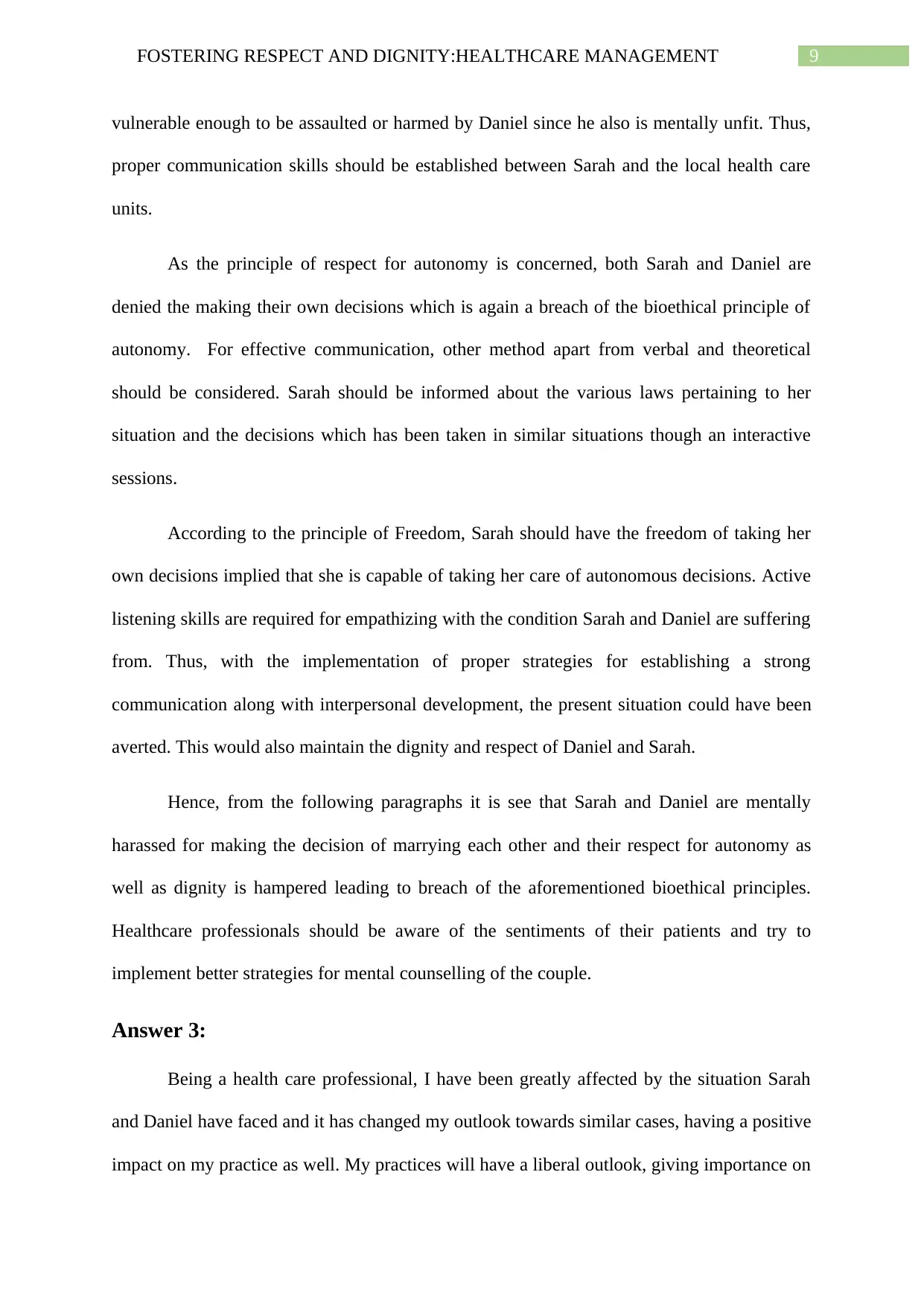
9FOSTERING RESPECT AND DIGNITY:HEALTHCARE MANAGEMENT
vulnerable enough to be assaulted or harmed by Daniel since he also is mentally unfit. Thus,
proper communication skills should be established between Sarah and the local health care
units.
As the principle of respect for autonomy is concerned, both Sarah and Daniel are
denied the making their own decisions which is again a breach of the bioethical principle of
autonomy. For effective communication, other method apart from verbal and theoretical
should be considered. Sarah should be informed about the various laws pertaining to her
situation and the decisions which has been taken in similar situations though an interactive
sessions.
According to the principle of Freedom, Sarah should have the freedom of taking her
own decisions implied that she is capable of taking her care of autonomous decisions. Active
listening skills are required for empathizing with the condition Sarah and Daniel are suffering
from. Thus, with the implementation of proper strategies for establishing a strong
communication along with interpersonal development, the present situation could have been
averted. This would also maintain the dignity and respect of Daniel and Sarah.
Hence, from the following paragraphs it is see that Sarah and Daniel are mentally
harassed for making the decision of marrying each other and their respect for autonomy as
well as dignity is hampered leading to breach of the aforementioned bioethical principles.
Healthcare professionals should be aware of the sentiments of their patients and try to
implement better strategies for mental counselling of the couple.
Answer 3:
Being a health care professional, I have been greatly affected by the situation Sarah
and Daniel have faced and it has changed my outlook towards similar cases, having a positive
impact on my practice as well. My practices will have a liberal outlook, giving importance on
vulnerable enough to be assaulted or harmed by Daniel since he also is mentally unfit. Thus,
proper communication skills should be established between Sarah and the local health care
units.
As the principle of respect for autonomy is concerned, both Sarah and Daniel are
denied the making their own decisions which is again a breach of the bioethical principle of
autonomy. For effective communication, other method apart from verbal and theoretical
should be considered. Sarah should be informed about the various laws pertaining to her
situation and the decisions which has been taken in similar situations though an interactive
sessions.
According to the principle of Freedom, Sarah should have the freedom of taking her
own decisions implied that she is capable of taking her care of autonomous decisions. Active
listening skills are required for empathizing with the condition Sarah and Daniel are suffering
from. Thus, with the implementation of proper strategies for establishing a strong
communication along with interpersonal development, the present situation could have been
averted. This would also maintain the dignity and respect of Daniel and Sarah.
Hence, from the following paragraphs it is see that Sarah and Daniel are mentally
harassed for making the decision of marrying each other and their respect for autonomy as
well as dignity is hampered leading to breach of the aforementioned bioethical principles.
Healthcare professionals should be aware of the sentiments of their patients and try to
implement better strategies for mental counselling of the couple.
Answer 3:
Being a health care professional, I have been greatly affected by the situation Sarah
and Daniel have faced and it has changed my outlook towards similar cases, having a positive
impact on my practice as well. My practices will have a liberal outlook, giving importance on
Secure Best Marks with AI Grader
Need help grading? Try our AI Grader for instant feedback on your assignments.

10FOSTERING RESPECT AND DIGNITY:HEALTHCARE MANAGEMENT
fostering respect and dignity among all patients which would be without any biasness.
Moreover, special interactive sessions will be conducted focussing on improving the
interpersonal as well as communication skills among the patients. One of the most important
requirements of a health care professional is to understand the requirements of patients with
learning abilities through their body language. I would improvise my listening skills for
establishment of a strong therapeutic relationship. Being aware of the developments is
another solution to such issues involving legal rules and regulations. Thus, I would be
updated with the legal acts and modifications of rules and regulations involving the Mental
Capacity Act passed in 2005. Moreover, I would discuss this issue with other people of my
profession who would help me to give an insight into this matter.
As an individual, the situation faced by Sarah and Daniel has enriched me with the
knowledge of approaching a holistic approach towards my patient. I have always believed in
pragmatic solutions following the legal rules and regulations. However, this case study has
changed my perception of handling such dire situations and given me the chance to reflect
upon my principles. I would consider the comfort and counselling of my patient above all
medical interventions. My own concepts of dealing with mentally sensitive patients have
changed as I would be careful not to hurt their sentiments. I would also follow the bioethical
principles of fostering respect and dignity to my patient, allowing his autonomy of decisions
as well. Doubting on the vulnerability as well as autonomy of decisions and the included
freedom of mentally challenged people should is not acceptable in the contemporary ethics.
Hence, I would continue with my expertise keeping the following ethical principles in mind
and implementing them wherever required.
My own developments as a person alongside a health professional have undergone a
massive change. I would much more research work on the importance of bioethical principles
followed in similar kind of cases. I would also conduct a comparative study comprising of the
fostering respect and dignity among all patients which would be without any biasness.
Moreover, special interactive sessions will be conducted focussing on improving the
interpersonal as well as communication skills among the patients. One of the most important
requirements of a health care professional is to understand the requirements of patients with
learning abilities through their body language. I would improvise my listening skills for
establishment of a strong therapeutic relationship. Being aware of the developments is
another solution to such issues involving legal rules and regulations. Thus, I would be
updated with the legal acts and modifications of rules and regulations involving the Mental
Capacity Act passed in 2005. Moreover, I would discuss this issue with other people of my
profession who would help me to give an insight into this matter.
As an individual, the situation faced by Sarah and Daniel has enriched me with the
knowledge of approaching a holistic approach towards my patient. I have always believed in
pragmatic solutions following the legal rules and regulations. However, this case study has
changed my perception of handling such dire situations and given me the chance to reflect
upon my principles. I would consider the comfort and counselling of my patient above all
medical interventions. My own concepts of dealing with mentally sensitive patients have
changed as I would be careful not to hurt their sentiments. I would also follow the bioethical
principles of fostering respect and dignity to my patient, allowing his autonomy of decisions
as well. Doubting on the vulnerability as well as autonomy of decisions and the included
freedom of mentally challenged people should is not acceptable in the contemporary ethics.
Hence, I would continue with my expertise keeping the following ethical principles in mind
and implementing them wherever required.
My own developments as a person alongside a health professional have undergone a
massive change. I would much more research work on the importance of bioethical principles
followed in similar kind of cases. I would also conduct a comparative study comprising of the
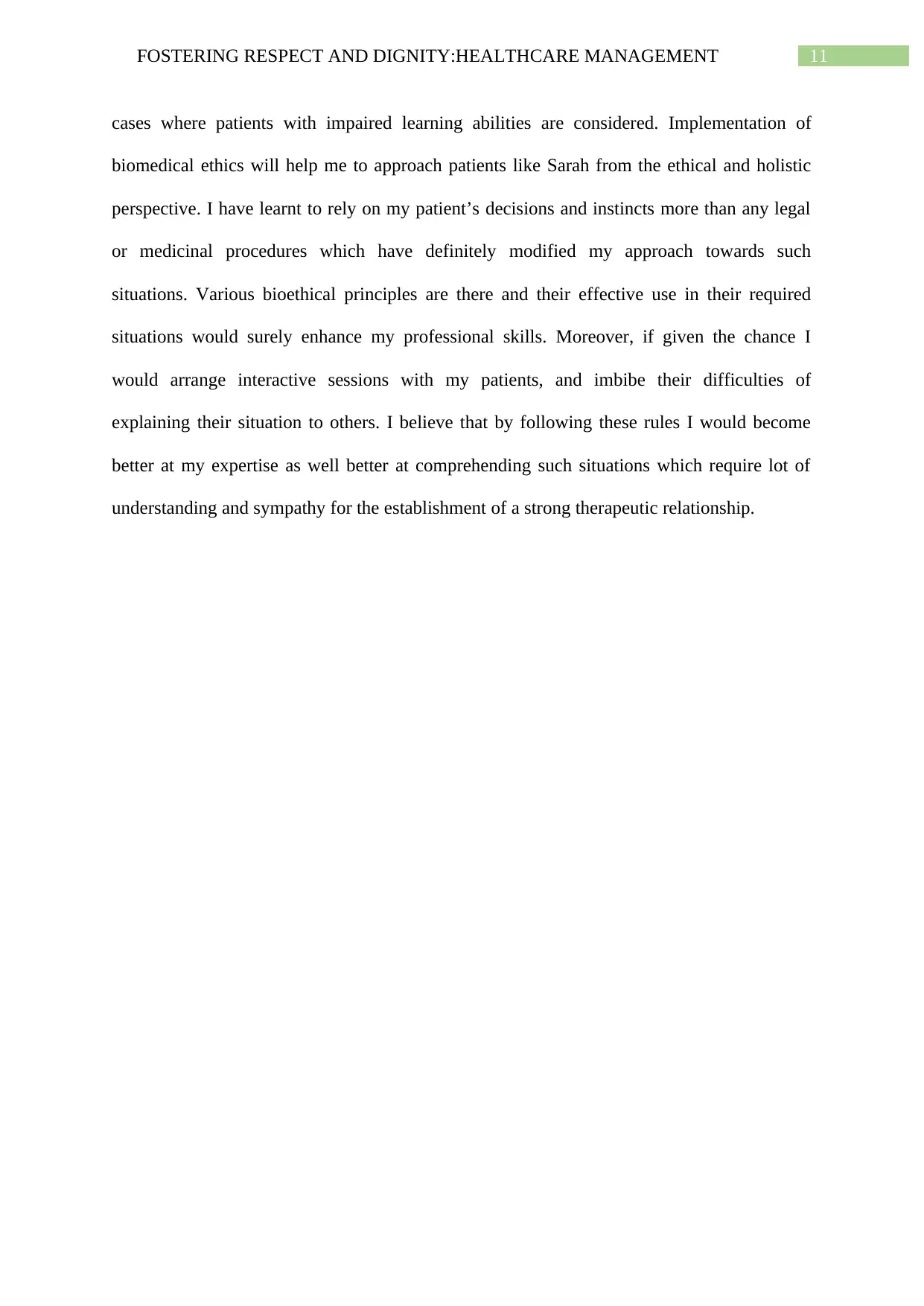
11FOSTERING RESPECT AND DIGNITY:HEALTHCARE MANAGEMENT
cases where patients with impaired learning abilities are considered. Implementation of
biomedical ethics will help me to approach patients like Sarah from the ethical and holistic
perspective. I have learnt to rely on my patient’s decisions and instincts more than any legal
or medicinal procedures which have definitely modified my approach towards such
situations. Various bioethical principles are there and their effective use in their required
situations would surely enhance my professional skills. Moreover, if given the chance I
would arrange interactive sessions with my patients, and imbibe their difficulties of
explaining their situation to others. I believe that by following these rules I would become
better at my expertise as well better at comprehending such situations which require lot of
understanding and sympathy for the establishment of a strong therapeutic relationship.
cases where patients with impaired learning abilities are considered. Implementation of
biomedical ethics will help me to approach patients like Sarah from the ethical and holistic
perspective. I have learnt to rely on my patient’s decisions and instincts more than any legal
or medicinal procedures which have definitely modified my approach towards such
situations. Various bioethical principles are there and their effective use in their required
situations would surely enhance my professional skills. Moreover, if given the chance I
would arrange interactive sessions with my patients, and imbibe their difficulties of
explaining their situation to others. I believe that by following these rules I would become
better at my expertise as well better at comprehending such situations which require lot of
understanding and sympathy for the establishment of a strong therapeutic relationship.

12FOSTERING RESPECT AND DIGNITY:HEALTHCARE MANAGEMENT
References
Airth-Kindree, N.M. and Kirkhorn, L.E.C., 2016. Ethical grand rounds: Teaching ethics at
the point of care. Nursing education perspectives, 37(1), pp.48-50.
Arnold, E.C. and Boggs, K.U., 2015. Interpersonal Relationships-E-Book: Professional
Communication Skills for Nurses. Elsevier Health Sciences.
Arnold, E.C. and Boggs, K.U., 2015. Interpersonal Relationships-E-Book: Professional
Communication Skills for Nurses. Elsevier Health Sciences.
Ball, J.E., Murrells, T., Rafferty, A.M., Morrow, E. and Griffiths, P., 2014. ‘Care left
undone’during nursing shifts: associations with workload and perceived quality of care. BMJ
Qual Saf, 23(2), pp.116-125.
Bramhall, E., 2014. Effective communication skills in nursing practice. Nursing Standard
(2014+), 29(14), p.53.
Brown, R.A., Barber, P. and Martin, D., 2015. The Mental Capacity Act 2005: A Guide for
Practice. Learning Matters.
Cartwright, T., 2011. Setting priorities: personal values, organizational results (Vol. 124).
John Wiley & Sons.
Coulter, A., Locock, L., Ziebland, S. and Calabrese, J., 2014. Collecting data on patient
experience is not enough: they must be used to improve care. Bmj, 348, p.g2225.
Cunha, T. and Garrafa, V., 2016. Vulnerability: a key principle for global
bioethics?. Cambridge Quarterly of Healthcare Ethics, 25(2), pp.197-208.
Dang, D. and Dearholt, S.L., 2017. Johns Hopkins nursing evidence-based practice: Model
and guidelines. Sigma Theta Tau.
References
Airth-Kindree, N.M. and Kirkhorn, L.E.C., 2016. Ethical grand rounds: Teaching ethics at
the point of care. Nursing education perspectives, 37(1), pp.48-50.
Arnold, E.C. and Boggs, K.U., 2015. Interpersonal Relationships-E-Book: Professional
Communication Skills for Nurses. Elsevier Health Sciences.
Arnold, E.C. and Boggs, K.U., 2015. Interpersonal Relationships-E-Book: Professional
Communication Skills for Nurses. Elsevier Health Sciences.
Ball, J.E., Murrells, T., Rafferty, A.M., Morrow, E. and Griffiths, P., 2014. ‘Care left
undone’during nursing shifts: associations with workload and perceived quality of care. BMJ
Qual Saf, 23(2), pp.116-125.
Bramhall, E., 2014. Effective communication skills in nursing practice. Nursing Standard
(2014+), 29(14), p.53.
Brown, R.A., Barber, P. and Martin, D., 2015. The Mental Capacity Act 2005: A Guide for
Practice. Learning Matters.
Cartwright, T., 2011. Setting priorities: personal values, organizational results (Vol. 124).
John Wiley & Sons.
Coulter, A., Locock, L., Ziebland, S. and Calabrese, J., 2014. Collecting data on patient
experience is not enough: they must be used to improve care. Bmj, 348, p.g2225.
Cunha, T. and Garrafa, V., 2016. Vulnerability: a key principle for global
bioethics?. Cambridge Quarterly of Healthcare Ethics, 25(2), pp.197-208.
Dang, D. and Dearholt, S.L., 2017. Johns Hopkins nursing evidence-based practice: Model
and guidelines. Sigma Theta Tau.
Paraphrase This Document
Need a fresh take? Get an instant paraphrase of this document with our AI Paraphraser
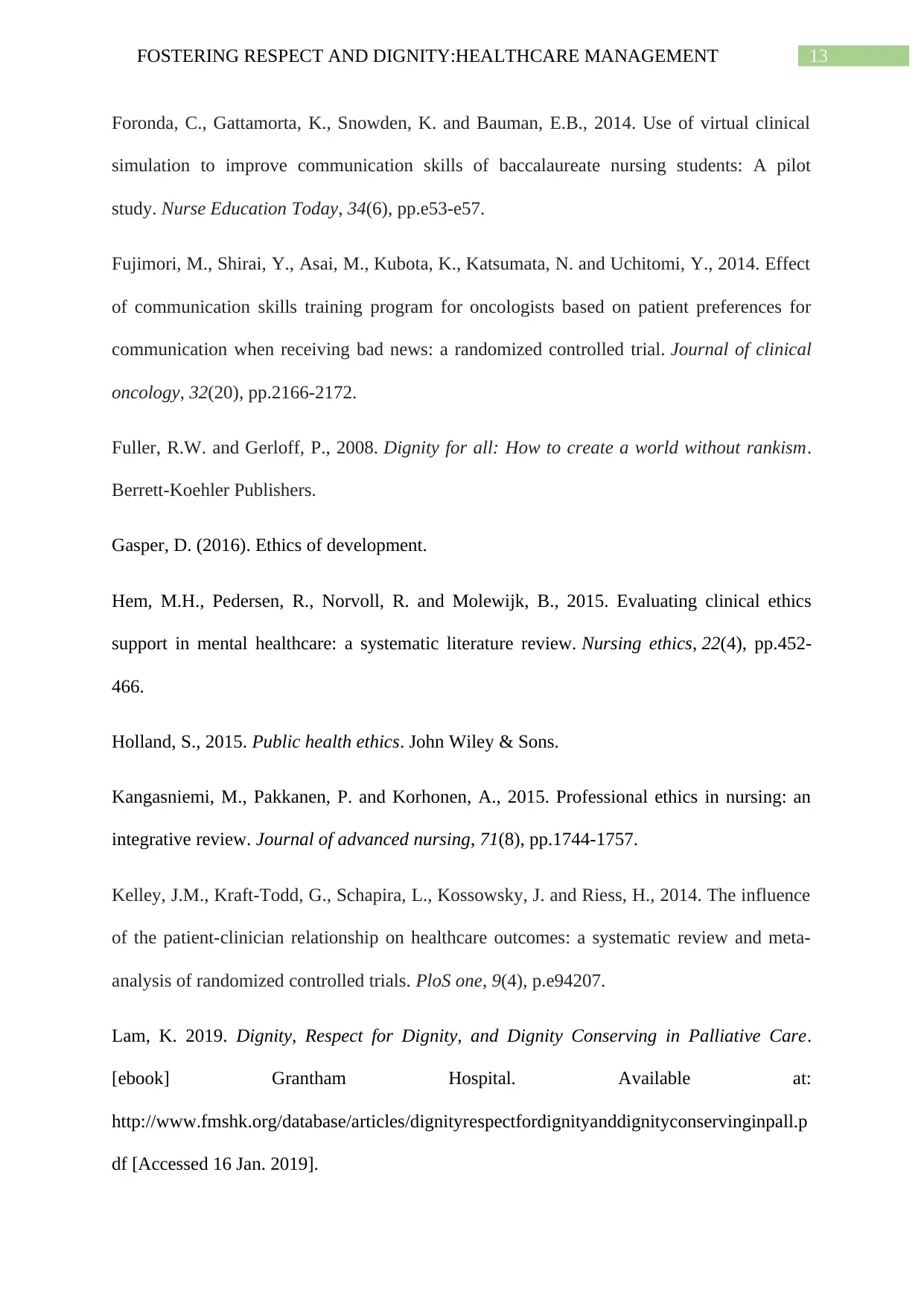
13FOSTERING RESPECT AND DIGNITY:HEALTHCARE MANAGEMENT
Foronda, C., Gattamorta, K., Snowden, K. and Bauman, E.B., 2014. Use of virtual clinical
simulation to improve communication skills of baccalaureate nursing students: A pilot
study. Nurse Education Today, 34(6), pp.e53-e57.
Fujimori, M., Shirai, Y., Asai, M., Kubota, K., Katsumata, N. and Uchitomi, Y., 2014. Effect
of communication skills training program for oncologists based on patient preferences for
communication when receiving bad news: a randomized controlled trial. Journal of clinical
oncology, 32(20), pp.2166-2172.
Fuller, R.W. and Gerloff, P., 2008. Dignity for all: How to create a world without rankism.
Berrett-Koehler Publishers.
Gasper, D. (2016). Ethics of development.
Hem, M.H., Pedersen, R., Norvoll, R. and Molewijk, B., 2015. Evaluating clinical ethics
support in mental healthcare: a systematic literature review. Nursing ethics, 22(4), pp.452-
466.
Holland, S., 2015. Public health ethics. John Wiley & Sons.
Kangasniemi, M., Pakkanen, P. and Korhonen, A., 2015. Professional ethics in nursing: an
integrative review. Journal of advanced nursing, 71(8), pp.1744-1757.
Kelley, J.M., Kraft-Todd, G., Schapira, L., Kossowsky, J. and Riess, H., 2014. The influence
of the patient-clinician relationship on healthcare outcomes: a systematic review and meta-
analysis of randomized controlled trials. PloS one, 9(4), p.e94207.
Lam, K. 2019. Dignity, Respect for Dignity, and Dignity Conserving in Palliative Care.
[ebook] Grantham Hospital. Available at:
http://www.fmshk.org/database/articles/dignityrespectfordignityanddignityconservinginpall.p
df [Accessed 16 Jan. 2019].
Foronda, C., Gattamorta, K., Snowden, K. and Bauman, E.B., 2014. Use of virtual clinical
simulation to improve communication skills of baccalaureate nursing students: A pilot
study. Nurse Education Today, 34(6), pp.e53-e57.
Fujimori, M., Shirai, Y., Asai, M., Kubota, K., Katsumata, N. and Uchitomi, Y., 2014. Effect
of communication skills training program for oncologists based on patient preferences for
communication when receiving bad news: a randomized controlled trial. Journal of clinical
oncology, 32(20), pp.2166-2172.
Fuller, R.W. and Gerloff, P., 2008. Dignity for all: How to create a world without rankism.
Berrett-Koehler Publishers.
Gasper, D. (2016). Ethics of development.
Hem, M.H., Pedersen, R., Norvoll, R. and Molewijk, B., 2015. Evaluating clinical ethics
support in mental healthcare: a systematic literature review. Nursing ethics, 22(4), pp.452-
466.
Holland, S., 2015. Public health ethics. John Wiley & Sons.
Kangasniemi, M., Pakkanen, P. and Korhonen, A., 2015. Professional ethics in nursing: an
integrative review. Journal of advanced nursing, 71(8), pp.1744-1757.
Kelley, J.M., Kraft-Todd, G., Schapira, L., Kossowsky, J. and Riess, H., 2014. The influence
of the patient-clinician relationship on healthcare outcomes: a systematic review and meta-
analysis of randomized controlled trials. PloS one, 9(4), p.e94207.
Lam, K. 2019. Dignity, Respect for Dignity, and Dignity Conserving in Palliative Care.
[ebook] Grantham Hospital. Available at:
http://www.fmshk.org/database/articles/dignityrespectfordignityanddignityconservinginpall.p
df [Accessed 16 Jan. 2019].

14FOSTERING RESPECT AND DIGNITY:HEALTHCARE MANAGEMENT
Leathard, A. and McLaren, S. eds., 2007. Ethics: contemporary challenges in health and
social care. Policy Press.
Mason-Whitehead, E., McIntosh-Scott, A., Bryan, A. and Mason, T. eds., 2008. Key concepts
in nursing. Sage.
Moore, P.M., Rivera, S., Bravo‐Soto, G.A., Olivares, C. and Lawrie, T.A., 2018.
Communication skills training for healthcare professionals working with people who have
cancer. Cochrane Database of Systematic Reviews, (7).
Ramos, F.R.S., Brehmer, L.C.D.F., Vargas, M.A., Trombetta, A.P., Silveira, L.R. and Drago,
L., 2015. Ethical conflicts and the process of reflection in undergraduate nursing students in
Brazil. Nursing ethics, 22(4), pp.428-439.
Shariff, N.J., 2015. Empowerment model for nurse leaders’ participation in health policy
development: an east African perspective. BMC nursing, 14(1), p.31.
Leathard, A. and McLaren, S. eds., 2007. Ethics: contemporary challenges in health and
social care. Policy Press.
Mason-Whitehead, E., McIntosh-Scott, A., Bryan, A. and Mason, T. eds., 2008. Key concepts
in nursing. Sage.
Moore, P.M., Rivera, S., Bravo‐Soto, G.A., Olivares, C. and Lawrie, T.A., 2018.
Communication skills training for healthcare professionals working with people who have
cancer. Cochrane Database of Systematic Reviews, (7).
Ramos, F.R.S., Brehmer, L.C.D.F., Vargas, M.A., Trombetta, A.P., Silveira, L.R. and Drago,
L., 2015. Ethical conflicts and the process of reflection in undergraduate nursing students in
Brazil. Nursing ethics, 22(4), pp.428-439.
Shariff, N.J., 2015. Empowerment model for nurse leaders’ participation in health policy
development: an east African perspective. BMC nursing, 14(1), p.31.
1 out of 15
Related Documents
Your All-in-One AI-Powered Toolkit for Academic Success.
+13062052269
info@desklib.com
Available 24*7 on WhatsApp / Email
![[object Object]](/_next/static/media/star-bottom.7253800d.svg)
Unlock your academic potential
© 2024 | Zucol Services PVT LTD | All rights reserved.




